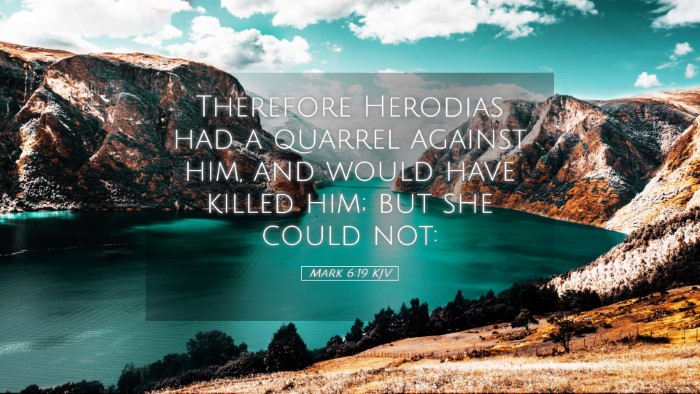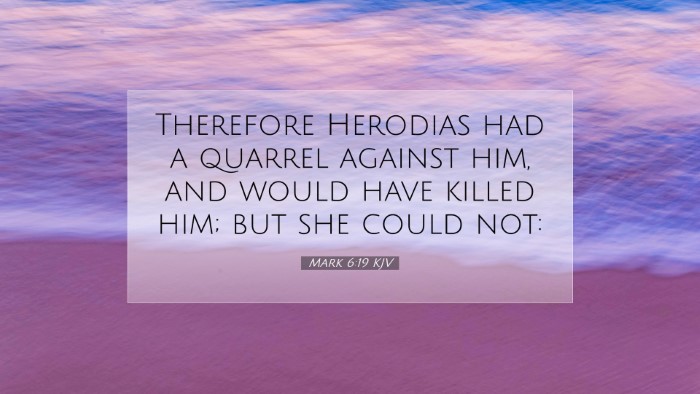Commentary on Mark 6:19
Mark 6:19 states:
"Therefore Herodias had a quarrel against him, and would have killed him; but she could not."
This verse occurs in the context of John the Baptist's confrontation with Herod Antipas regarding the lawfulness of his marriage to Herodias, his brother's wife. The significance of this passage lays deep in the implications of righteous living, the power struggles of the political realm, and the prophetic voice calling for repentance.
Contextual Background
To fully appreciate the weight of Mark 6:19, it is essential to understand the historical and political climate of the time. John the Baptist was a pivotal figure, embodying the prophetic tradition of Israel. His denunciation of Herod's unlawful marriage ignited hostility, particularly from Herodias, who saw in John a threat to her precarious social position.
Insights from Matthew Henry
Matthew Henry provides essential commentary on the motives behind Herodias's anger:
- Herodias is portrayed not merely as a scorned woman but as someone whose desire for power and status was threatened by John's condemnation.
- Henry notes that Herodias had a "quarrel" against John, which indicates a deep-seated animosity stemming from John's unyielding call for repentance.
- The emphasis is placed on Herodias's intent to kill John, revealing her ruthlessness and manipulation within the political structure; it demonstrates the extent individuals will go to protect their desires.
Insights from Albert Barnes
Albert Barnes elucidates the implications of this quarrel:
- Barnes emphasizes that John's ministry was not merely personal but had significant moral implications that directly challenged the authority of the ruling class.
- He comments on the resistance of Herod, suggesting that while Herod had a measure of respect for John, he ultimately capitulated to Herodias's venomous desires.
- Barnes further reflects on the "but she could not" phrase, elucidating Herod’s reluctance to fulfill her murderous desires due to fear of the people and John's esteemed reputation.
Insights from Adam Clarke
Adam Clarke provides a detailed analysis of the narrative's ethical dimensions:
- Clarke underscores the ethical dichotomy present in the story and the stark contrast between John's moral courage and Herodias's ambition.
- He outlines how the various characters in this narrative reflect broader themes of power, loyalty, and individual conviction.
- Clarke notes that the conflict speaks to the broader fight between righteousness and unrighteousness within political spheres, highlighting John's role as a voice for truth.
Theological Reflections
This verse serves as a reminder of the perennial struggle between the prophet and the political authority:
- The courage to speak truthfully, even to power, is a hallmark of the prophetic tradition.
- This incident encourages pastoral reflection on the role of the church as a voice for justice, urging leaders to confront immorality fearlessly.
- It provides a lens through which the community of faith can assess their stance in contemporary socio-political issues: Are they echoing the voice of John, or are they aligning more closely with the political winds of their day?
Conclusion
Mark 6:19 encapsulates complex dynamics of power, ethics, and faith. Through the insights offered by esteemed commentators such as Matthew Henry, Albert Barnes, and Adam Clarke, scholars, students, pastors, and theologians are invited to engage deeply with the text. They can develop a robust understanding of how John the Baptist's forthrightness and Herodias's animosity symbolize the ongoing struggle between truth and tyranny, righteousness and corruption within all forms of governance. The narrative challenges believers to reflect on their own lives: Are they contending for truth in their societal roles, or are they silent in the face of injustice?


